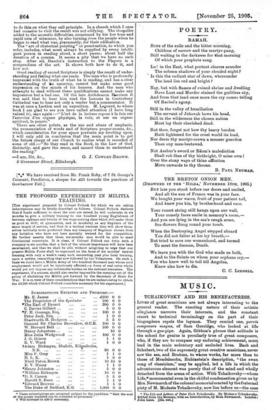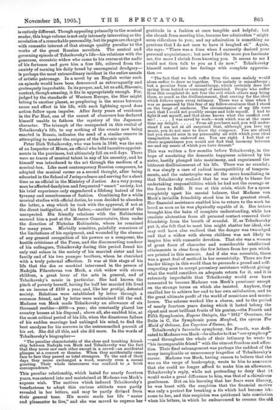SUBSCRIPTIONS RECEIVED AND PaorasEn
Mr. E. James ... ... £200 0
The Proprietor of the Spectator ... 100 0
The Earl of Dysart ... ... 200 0 C. Davies Gilbert ... 50 *F. H. Gossage, Esq. ... • •• 100 0 Peter Jack, Esq. 10 Shadworth H. Hodgson ... 55 General Sir Charles Brownlow, G.C.B. W. Heward Bell ...
Henry Johnstone ...
Miss Julia Wedgwood ... . J. G. Grieve tAfiam Birkmyre, Shalott, Miss F. Gray ...
Nicol Paton.Brown E. V. Hussy ... *Heary Johnston ... *William Birkruyre
*D. S. Carson ... ... • Harold S. Burn ... *Edward Browne ... The Duke of Bedford, K.G.
100 0 100 0 10 100 0 1 1 10 300
1 1 0 10 0 10 10 0
1 1 50 • 10 0 55 11 1 1
1,000 0 0 • These subscriptions are promised subject to the condition "that the rest of the money required can be collected or pronaised." ' t Will increase to £.50 if necessary.
'POETRY. RAMAH.
Solis of the exile and the bitter scorning,
Children of sorrow and the martyr-pang, Still waiting in the darkness for that morning Of which your prophets sang.
Lc)! in the East, what portent cleaves asunder The solemn shadows of your clouded night? Is this the radiant star of dawn, whereunder The land lies red and bright ?
Nay, but with flames of ruined shrine and dwelling Have Lust and Murder stained the guiltless sky, And from that land once more the cry comes telling Of Rachel's agony.
Still in the valley of humiliation The servant of Jehovah bows his head, Still in the wilderness the chosen nation Must lay their cherished dead.
But thou, forget not how thy heavy burden Rath lightened for the cruel world its load, Nor deem thy martyr-crown a meaner guerdon Than any man-bestowed.
Not Asshur's sword or Edom's malediction Shall rob thee of thy birthright, 0 mine own Over the stony ways of thine affliction Move onwards to thy throne. B. PAUL NEUMAN.
THE BRETON ONION MEN. (DROWNED IN THE HILDA,' NOVEMBER 18TH, 1905.) BUT late you stood before our doors and smiled, And all the sun of France was in your face. We bought your wares, fruit of your patient toil, And knew you kin, by brotherhood and race.
Your russet string still hangs upon our wall, Your comely faces smile in memory's room,— And you are lying in the sea's rough arms, Sea-flowers flung round your tomb. • When the Destroying Angel stepped aboard
You did not falter at his icy breath,—
But tried to save our womanhood, and turned To meet the foeman, Death.
We leave you with the God who made us both, And to the Saints on whom your orphans cry,— You who knew well to toil till Angelus, Knew also how to die. C. C. LIDDELL.
MUSIC.
TCHAIKOVSKY AND HIS BENEFACTRESS. Lrvits of great musicians are not always interesting to the general reader. The exacting nature of their artistic allegiance narrows their interests, and the constant resort to technical terminology on the part of their biographers repels the layman. They remind one, panda campcntere magna, of Sam G-erridge, who looked at life through a gas-pipe. Again, Gibbon's phrase that solitude is the school for genius is peculiarly true of great composers, who, if they are to compass any enduring achievement, must lead in the main sedentary and secluded lives. Bach and Schubert, two of the supremely great creative musicians, never saw the sea, and Brahma, to whose works, far more than to those of Mendelssohn, Rubinstein's description, "the swan song of classicism," may be applied, led a life in which the adventurous element was purely that of the mind and wholly detached from the arena of action. With Tchaikovsky—whose Life,* monumental even in the skilful condensation given us by Mrs. Newmarch of the colossal memorialerecthd by the fraternal piety of M. Modeate Tchaikovsky, now lies before us—the case
• The This and Letters. of Peter Rich TchacorosIcy. By Modest e Tchaikovsky. R.dited: Eton). the Russian, with an Introduction, by Rosa Newmarch. London John Lane. [2,ls. net.]
is entirely different. Though appealing primarily to the musical reader, this huge volume is not only intensely interesting as the revelation of a remarkable personality, but its pages are charged with romantic interest of that strange quality peculiar td the works of the great Russian novelists. The central and governing episode of Tchaikovsky's life—his relations with the generous, eccentric widow who came to his rescue at the nadir of his fortunes and gave him a free life, relieved from the anxiety of earning his daily bread by uncongenial drudgery— is perhaps the most extraordinary incident in the entire annals of artistic patronage. In a novel by an English writer such an episode would have been denounced as extravagantly and grotesquely improbable. In its proper, and, let us add, Slavonic, context, though amazing, it fits in appropriately enough. For, judged by the standards of Western Europe, the Slav might belong to another planet, so perplexing is the nexus between cause and effect in his life, with such lightning speed does action follow upon impulse. After forty years of residence in the Far East, one of the sanest of observers has declared himself unable to fathom the mystery of the Japanese character. The triumph of the unexpected in this recital of Tchaikovsky's life, to say nothing of the events now being enacted in Russia, indicates the need of a similar reserve in attempting to master the enigma of the Slavonic spirit.
Peter Bich Tchaikovsky, who was born in 1840, was the son of an Inspector of Mines, an official who held lucrative appoint- ments in the provinces, but ultimately fell on evil days. There were no traces of musical talent in any of his ancestry, and he himself was introduced to the art through the medium of a musical-box. Like most contemporary Russian composers, he adopted the musical career as a second thought, after being educated in the School of Jurisprudence and serving for a short time as an official in the Ministry of Justice. As a very young man he affected dandyism and frequented" smart" society, but
his brief experience only engendered a lifelong hatred of the tyranny and senselessness of fashion. Combining for a while
musical studies with official duties, he soon decided to abandon the latter, a step which he took with the approval, if not at the direct instigation, of his father,—another instance of the unexpected. His friendly relations with the Rubinsteins secured him a post at the Moscow Conservatoire, then under the direction of Nicholas Rubinstein, where be remained for many years. Morbidly sensitive, painfully conscious of the limitations of his equipment, and wounded by the absence of any general recognition of his powers as a composer, the hostile criticisms of the Press, and the disconcerting candour of his colleagues, Tchaikovsky during this period found his only real solace in the society of his married sister and her
family and of his two younger brothers, whom he cherished with a truly paternal affection. It was at this stage of his life that the den ex machines' intervened in the person of
Nadejda Filaretovna von Meek, a rich widow with eleven children, a great lover of the arts in general, and of Tchaikovsky's music in particular. She had known the pinch of poverty herself, having for half her married life lived
on an income of £150 a year, and, like her proleg4, detested society. Relations were established by letter through a
common friend, and by letter were maintained till the end. Madame von Meek made Tchaikovsky an allowance of six
thousand roubles-2600—a year; she constantly placed her country houses at his disposal; above all, she enabled him, at the most critical period of his life, when the disastrous failure
of his sudden marriage had unhinged his mind, to find the best anodyne for his sorrows in the untrammelled pursuit of his art. She did all this, and she did more. In the words of Tchaikovsky's biographer-
" The peculiar characteristic of the close and touching friend- ship between Nadejda von Meek and Tchaikovsky was the fact that they never saw each other except in a crowd—an accidental glimpse at a concert or theatre. When they accidentally came face to face they passed as total strangers. To the end of their days they never exchanged a word, scarcely even a casual greeting. Their whole intercourse was confined to _a brisk correspondence."





















































 Previous page
Previous page